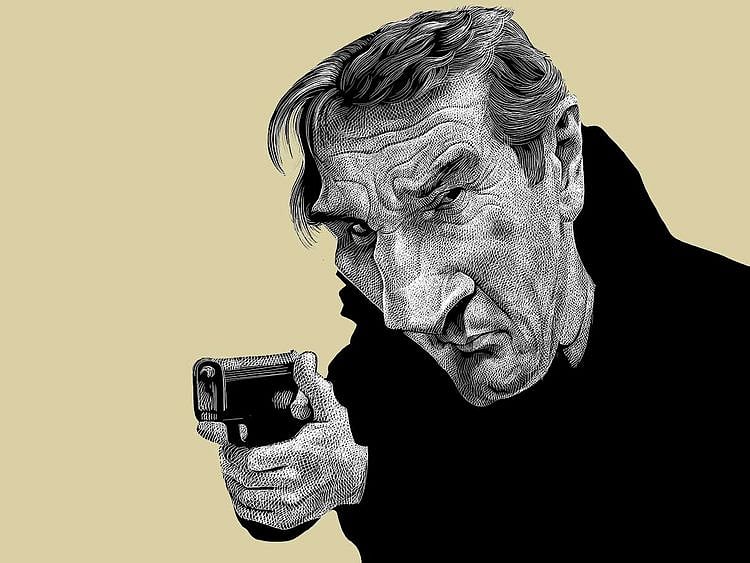My late wife had a cousin who is a somewhat successful actor in the United Kingdom. On a regular basis, if you watch series like Holby City, you’d see her as one of the leading female roles. The story goes, and I have no reason to doubt it, is that while Julie was younger and working in regional theatre productions up and down Britain, she dated Liam Neeson.
At the time, and I believe it’s about three decades ago, the future Oscar-nominated actor was trying to make it big too. Julie and he had a relationship, but in-law family scuttlebutt says she dumped him for an 18-year-old stagehand.
It’s been the subject of some discussion and laughter down the years, but maybe Julie had a sense of what truly made Neeson tick — or thick — depending on how you look at it.
The Irish-born actor landed firmly in hot water last week for an interview with The Independent when he claimed that he reacted to the rape of a women to whom he was close by lingering outside a pub for a week, wanting to murder a black person.
Naturally, the remarks have set off a furore, with the actor following it up by saying his remarks didn’t indicate he was racist, but was angry.
Neeson had been talking to The Independent as part of publicity for his latest movie, Cold Pursuit, and the remarks were meant in the context of trying to be able to relate to the picture’s main character who is avenging the murder of his son.
“God forbid you’ve ever had a member of your family hurt under criminal conditions,” he said, and then told the story of returning from a foreign trip to discover that a woman he knew well had been raped.
Shocking admission
“She handled the situation of the rape in the most extraordinary way,” he said. “But my immediate reaction was … I asked, did she know who it was? No. What colour were they? She said it was a black person.”
He continued: “I went up and down areas with a cosh, hoping I’d be approached by somebody — I’m ashamed to say that — and I did it for maybe a week, hoping some ‘black [expletive]’ would come out of a pub and have a go at me about something, you know? So that I could … kill him.”
Any way you look at it, that’s a pretty shocking admission and, with hindsight, remarks that Neeson undoubtedly wishes he hadn’t made. He has, and the cat is well and truly out of the bag.
During the 1990s, when the actor was very much on the up-and-up and was gaining A-listing status as a go-to leading man for Hollywood, I admired him.
If you haven’t seen the movie Michael Collins yet, watch it. For starters, it explains the basis of issues that are still relevant today, more so with Brexit, the backstop and the relationship between Britain and Ireland. Leeson plays the Irish revolutionary leader who drives the War of Independence against the British Empire, forcing it to end eight centuries of English rule over most of the island — the first time it had caved to a colonial force.
For Indians and Pakistanis, and other colonised peoples, the tactics used and the political outlook shaped their eventual freedom from the British two and a half decades later.
My grandfather and his brother worked for Collins, gathering intelligence, and grandad was jailed by the British during the struggle for manufacturing and distributing hand grenades from a bomb factory disguised as a bicycle repair shop.
Schindler’s List is another production in which I greatly admire Neeson’s work and the role of Oskar Schindler brought him an Oscar nomination for the 1993 film. Sadly, Neeson’s career seems to have taken a bit of a turn where he is stereotyped as a man seeking revenge, out to free a daughter or other family member wronged by a society of criminal elements. With that in mind, and given Hollywood’s stereotyping tendencies, Neeson’s remarks perhaps result from too many vengeful roles. But there is indeed a very distinct difference between reel life and real life, and for critics, his recent interview has crossed a line.
Is that career-ending? Hardly, given that others such as Robert Downey Jr or Mel Gibson have returned from the Hollywood wilderness after their legal and verbal faux pas.
Born in 1952 and raised as a Catholic in a Protestant-majority town of Ballymena, Northern Ireland — the local MP was the Reverend Ian Paisley, the firebrand Unionist leader — Neeson and his three siblings (his father was the caretaker of the local Catholic school) grew up as second-class citizens, as per the actor.
Neeson’s long-time wife, Natasha Richardson, was killed in a skiing accident outside Montreal a decade ago.
Having suffered that type of pain, Neeson likely feels he is unconstrained, having last year too expressed concern at the #MeToo movement for being a witch hunt and lacking focus. That stirred up the hornet’s nest then. Now, he’s just given it another proper poking. Ouch.
Mick O’Reilly is the Gulf News Foreign Correspondent based in Europe.
Sign up for the Daily Briefing
Get the latest news and updates straight to your inbox
Network Links
GN StoreDownload our app
© Al Nisr Publishing LLC 2026. All rights reserved.
